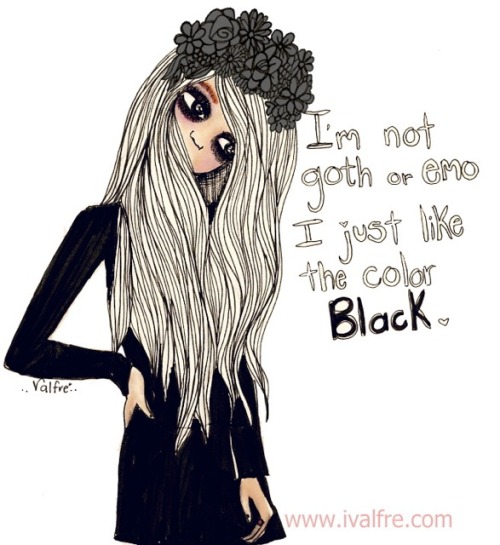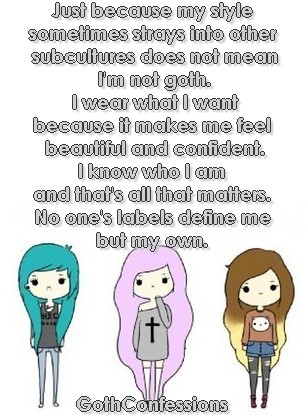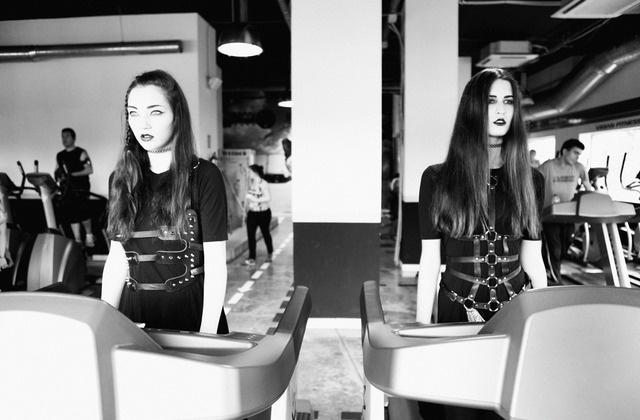Fashion and Identity
It's been commonly stated by many a fashionista and subculture adherent that what you wear says a very specific message to the world about who you are or what you're feeling. And while it may be true that fashion can be considered it's own form of language - with syntactic structure and rigid grammar rules - that language (just like spoken human language) is in constant flux.
For a couple of detailed articles about this phenomenon, check out the links below:
College Fashion
Fashion is a Feminist Issue
Reconstructing the Meaning
These do a much better job of explaining my point than any summary I could whip up, so I hope you're feeling scholarly today. :)
But, as I got to thinking about this idea, it occurred to me that this applies very much to those who are part of subcultures often identified by specific styles - namely, Goth, Punk, etc.
With the rise and popularity of fashions like Pastel Goth or Nu-Goth and the ever-present "Boho Hippie Vintage" stuff, it may be very hard to identify if a person is indeed part of a specific subculture or just dabbling in a variety of styles. There is nothing inherently bad about this, but it does pose problems unique to some of us.
At the same time, it presents us with a sort of relief from criticism about our life choices - after all, if little Suzie the Valedictorian wears black lipstick, it can't be all bad, right? Unnatural hair colors are trendy, so no one's going to bat an eye at your head of dark blue locks. Probably.
Our personal style stems from who we want to be or who we feel we are deep inside. Our identities are heavily influenced by culture and environment, and our fashion styles are part of this culture. Hence, a certain fashion can have very specific connotations that we seek to align ourselves with because it best fits who we are. We find common ground with others through our adoption of these connotations, we begin to feel as though we own them.
So when someone outside of the Goth subculture decides to don long black dresses and striped arm-warmers, it can be hard to resist the urge to claim it as belonging to a specific group and deny the outsider fashion rights. And really, it's silly. We know this, but I guess it all comes down to a knee-jerk reaction.
I digress.
The point I really want to make in this post is that the language of fashion is changing. The rules no longer mean what they used to and thus, certain motifs no long carry the same connotations. Wearing a giant black hat with a veil may have been associated with funeral wear at one point, before it became an identifying marker for a particular Goth. And that same image may no longer be associated with any specific message. A polo shirt no longer means you're a rich preppy snob. Jeans used to be for the working man, now they're worn by everyone. So yes, this has been happening for a long time, but definitely not on such a large scale.
It is my hope that for many of us, this will also work in the opposite direction. We do not need to adhere to a particular look to feel connected to a certain group. Today I'm wearing a vintage pink and white striped dress with minimal makeup and curly hair. Do I feel any less Goth? Do I feel inclined to avoid The Cure on my playlist today? Of course not.
The only difference is that the average Joe isn't going to automatically pin me as a Goth. Fine, because it doesn't really matter. In the end, it's really hard to pin me down as anything, because my look changes so often. Some days I wear all black. Some days I like vintage dresses and pearls. Maybe tomorrow I'll wear a maxi dress with a crochet vest and crimped hair. I prefer to keep people guessing. And that's becoming increasingly common in the fashion world today.
Honestly, I think it's the best thing to happen in the industry. There's nothing wrong with experimenting on our identity and trying on different facets of ourselves. There's also nothing wrong with pretending to be someone we're not once in a while - if living your little fantasy harms no one then who cares?
Goth fashion is moving beyond messages and meanings, much like mainstream style. Rather than a rigid structure of encoded symbols, fashion has become art - appreciated for the image itself rather than what it might represent.
For a couple of detailed articles about this phenomenon, check out the links below:
College Fashion
Fashion is a Feminist Issue
Reconstructing the Meaning
These do a much better job of explaining my point than any summary I could whip up, so I hope you're feeling scholarly today. :)
But, as I got to thinking about this idea, it occurred to me that this applies very much to those who are part of subcultures often identified by specific styles - namely, Goth, Punk, etc.
With the rise and popularity of fashions like Pastel Goth or Nu-Goth and the ever-present "Boho Hippie Vintage" stuff, it may be very hard to identify if a person is indeed part of a specific subculture or just dabbling in a variety of styles. There is nothing inherently bad about this, but it does pose problems unique to some of us.
At the same time, it presents us with a sort of relief from criticism about our life choices - after all, if little Suzie the Valedictorian wears black lipstick, it can't be all bad, right? Unnatural hair colors are trendy, so no one's going to bat an eye at your head of dark blue locks. Probably.
Our personal style stems from who we want to be or who we feel we are deep inside. Our identities are heavily influenced by culture and environment, and our fashion styles are part of this culture. Hence, a certain fashion can have very specific connotations that we seek to align ourselves with because it best fits who we are. We find common ground with others through our adoption of these connotations, we begin to feel as though we own them.
So when someone outside of the Goth subculture decides to don long black dresses and striped arm-warmers, it can be hard to resist the urge to claim it as belonging to a specific group and deny the outsider fashion rights. And really, it's silly. We know this, but I guess it all comes down to a knee-jerk reaction.
I digress.
The point I really want to make in this post is that the language of fashion is changing. The rules no longer mean what they used to and thus, certain motifs no long carry the same connotations. Wearing a giant black hat with a veil may have been associated with funeral wear at one point, before it became an identifying marker for a particular Goth. And that same image may no longer be associated with any specific message. A polo shirt no longer means you're a rich preppy snob. Jeans used to be for the working man, now they're worn by everyone. So yes, this has been happening for a long time, but definitely not on such a large scale.
It is my hope that for many of us, this will also work in the opposite direction. We do not need to adhere to a particular look to feel connected to a certain group. Today I'm wearing a vintage pink and white striped dress with minimal makeup and curly hair. Do I feel any less Goth? Do I feel inclined to avoid The Cure on my playlist today? Of course not.
The only difference is that the average Joe isn't going to automatically pin me as a Goth. Fine, because it doesn't really matter. In the end, it's really hard to pin me down as anything, because my look changes so often. Some days I wear all black. Some days I like vintage dresses and pearls. Maybe tomorrow I'll wear a maxi dress with a crochet vest and crimped hair. I prefer to keep people guessing. And that's becoming increasingly common in the fashion world today.
Honestly, I think it's the best thing to happen in the industry. There's nothing wrong with experimenting on our identity and trying on different facets of ourselves. There's also nothing wrong with pretending to be someone we're not once in a while - if living your little fantasy harms no one then who cares?
Goth fashion is moving beyond messages and meanings, much like mainstream style. Rather than a rigid structure of encoded symbols, fashion has become art - appreciated for the image itself rather than what it might represent.
Are you a narrative or an image? Are you a book or an abstract painting?
Let me know in the comments below!






I think goth has been around for so long now that there's a need for experimentation. Velvet and lace has been done to death and I believe this is why we're seeing a new batch of subcultures emerging. I don't consider myself goth but I acknowledge that I wear goth clothing (specifically goth brands). I know that people will consider me goth when I'm wearing that stuff. Like you, I have my down days where I wear ordinary looking clothing or my dressy days where I'll go vintage. I have no specific style because I just dress how I want. I have noticed a huge difference though in people's reactions to me depending on what I wear. I've always found that alternative and goth enthusiasts want nothing to do with me on my down days. I remember once I was dressed normally and I went to a comic shop where the lady was snarky and treated me like crap, a few months later I came backed decked out in PVC with stompers on and she treated me like royalty. It's not like she was outwardly goth or anything, she dressed rather normal, so why treat me so strangely? It used to be that you were ostracized for being different not revered for it. I can only hope that in time people will become more accommodating of different styles and the need to experiment. I also hope that maybe one day people won't judge you just off of what you wear... but that doesn't seem too likely.
ReplyDeleteI've done a couple of "gothy" Youtube videos but because I don't look hardcore Goth in all of them, I actually had a private message from some twat ripping me a new one because I wasn't a "troo gawth" and how dare I!? It was kind of ridiculous. :)
DeleteMy only issue with this is that the local Fetish/Goth/Industrial Club has a strict wardrobe which is incredibly didactic. They list clothing in two ways (and I'm sorry for taking up so much room in this comment section).
ReplyDeleteAppropriate Examples:
Nightly Theme-Appropriate Clothing
-OR- Fetish Wear
Including (but not limited to):
Liquids
Corsets
Leather
Vinyl
PVC
Platforms
Collars
Cuffs
Fishnets
Satin/Lace
Tape
Strapping
Chain
Knotwork
Roleplay Gear
Boots
Thigh-highs
Blacklight Gear
Goth/Industrial Night Standards
Dress/Button up/Standard Black
Cute Black Dress Every Girl Owns
Dress Jeans/Slacks
Prince's Entire Wardrobe
Inappropriate Examples:
Including (but not limited to):
Khakis
Popped Collars
Baseball Caps (Fashionable Hats OK)
Flip Flops
Sunglasses
Crappy Hoodies that are boring
Sweatshirts/Sweatpants
Baggy or Ill-Fitting Clothing
Do-rags or crappy headwear
Bajas
White Or Brightly Colored Shirts
T-shirts With Crappy Slogans
Frat Wear
jCrew
Abercrombie
Britney Spears' Entire Wardrobe*
(*except in the Slave For You video)
What this tells me is that I am not welcome because of who I love-- a somewhat preppy fella who wears J.Crew. So, I can NEVER set foot in our goth club even when my clothing falls under their appropriate list because even though said fella would dress the part, my entire life men have expected/hoped/wished I would dress a certain way when I'm around their friends. They didn't want me to be me. Then walks in my current fella who, while it isn't his scene, loves me for me.
Why in the world is a counter-culture club being so counter counter-culture?!? (steps down off soapbox)
Sadly these dress-codes usually end up being written up because of the 'tourists' that keep coming to clubs and wanting to 'chat up the sexy death chicks' and acting inappropriately (especially in a sexual manner), and I imagine with being a fetish club, they've had enough people behaving like this to have a dress-code so casual tourists on a pub-crawl/bar-crawl don't come in and misbehave. However, this list seems exceedingly specific, and unless it's based on specific outfits of specific offenders, it does seem to be a case of "preppy kids keep out!"
DeleteThis is a valid point, but how do clubs handle the cases where your normal yuppie decides to don some chunky black eyeliner and fishnets with his friends just to cruise the local scene?
DeleteI would almost find that more disrespectful and obnoxious than someone in mainstream clothing with a genuine interest. I don't know....them be treacherous waters.
This was a thought-provoking post. :) It made me think about Baudrillard's Simulacra, have you heard about it? If I summarize it hastily, simulacra is the loss of meaning in the post-modern world. As an example, signs in a language like fashion loose their meaning (like the jeans are no longer for the working-class man etc.) That can lead to alienation, feeling empty or acting like those goth club people who Goth Gardener described. They desperately want to make a language mean something for their little group.
ReplyDeletePersonally I do not need random people on the street spot me as a goth but I do need acceptance as a goth from other people who identify themselves as goths. That's why I am in the blogger, writing about goth things and reading and interacting with other goth bloggers. :)
There are so freaking many subcultures and sub-subcultures these days it is impossible to spot and determine a random person in the street as one of a specific subculture and actually get it right (what that person thinks they are)!
I consider myself as an "Eldergoth" if we talk about lables. I do wear a lot of black but sometimes I dress very colourful. I don't want other to put a label on me, because labels gives prejudgements and narrowing peoples minds. I also don't want to put labels on others and I really hate when a social group is excluding those who "don't fit in". I was a pure rockabilly girl during my 20s and became one of those who turned my back on those who weren't vintage enough, it made me feel sick and was excluded myself when I refused to move to that certain part of town were everyone else in that scene lived (yuck). That kind of elitism sucks and I think everyone should be as uniqe as they want to.
ReplyDeleteYup, I hear you. I've got a friend in Montreal who's into the Rockabilly scene and she's mentioned some of this elitism kind of stuff too. I'm sorry you had to deal with that kind if idiocy.
DeleteI guess this is kind of why I never liked labels, I mean I get them on a level-- Kind of an identity and a way to meet like-minded people, and just something to "name" the stuff you're wearing(I mean I call myself Pastel Goth)... Although, it can definitely feel limiting, and I think the whole reason any of us are into Goth fashion is typically that we're interested in things outside of the norm,,, So what's wrong with a little experimentation? :)
ReplyDeleteI find this very interesting. When I was younger I was all about wearing black and having Goth style, now I wear a lot of colours and boho type outfits, and I think most people wouldn't even recognise me as Goth but most people I know don't seem to care. My playlist is still very Goth though :P
ReplyDeleteI think in the 10+ years I've been into alternative fashion, I've just been getting more and more stereotypically Goth, now wearing what I would have seen as 'special occasion' Romantic Goth stuff everyday, and while a LOT of it is because I just adore anachronistic stuff, part of it is because skinny jeans, stud belts, brightly coloured hair and a black top aren't enough to mark me as visibly Goth, and I want to be seen as visibly /a Goth/ - I'm proud of this subculture, and I also feel that if I'm visibly alternative out and about I can act as encouragement for other subcultural types in this small city to go out and about in flamboyant fashion without feeling they're on their own, and I also hope that being a visible Goth will mean other not-necessarily-visibly-alternative types might spot me as someone who may have interests in common with me and start up a conversation! I know some people judge and give me harsh comments, but I feel a lot safer being visibly alternative here than where I used to live; nobody's been aggressive or violent towards me here, just rude.
ReplyDeleteI understand what you mean. I would love for there to remain distinct "looks" or themes for a particular subculture - for identification purposes but also as a unifying message to others, but at the same time I do enjoy that people are breaking out of pre-defined boxes to create something new for themselves without having shove themselves into said boxes.
DeleteI do think that Goth will always be recognizable in it's own way. There are some things particular to our little group that will probably never catch on and that's pretty cool. :)